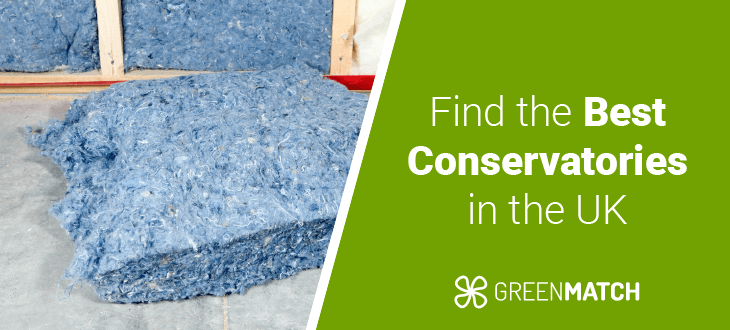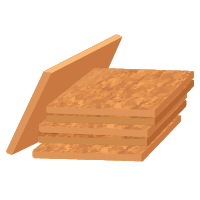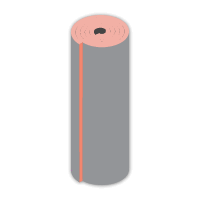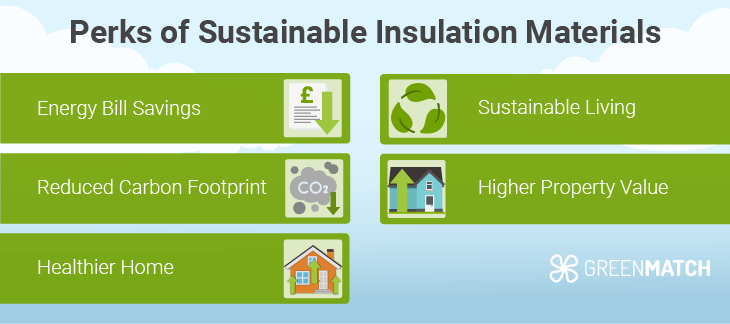Answer these simple questions and we will find you the BEST prices
Which type of solar quotes do you need?
It only takes 30 seconds
100% free with no obligation

Get Free quotes from insulation specialists near you

Save money by comparing quotes and choosing the most competitive offer

The service is 100% free and with no obligation
- GreenMatch
- Insulation
- Insulation Materials
- Sustainable Insulation
What Is the Most Sustainable Insulation in the UK?


- The myth that sustainable insulation materials won’t perform as well as their synthetic counterparts is false. Many eco-alternatives outperform cheaper synthetic options on the market.
- A wide range of modernised and eco insulation materials boast properties such as flame, smoke, moisture and mould resistance.
- Some examples of eco-friendly insulation alternatives are sheep wool, wood wool, cellulose, corkboard and much more.
Insulating your home is an upgrade that comes with a wealth of benefits. Slashing your energy bill, creating a comfortable home environment, and reducing your carbon footprint are just some of the perks you can enjoy with this handy investment.
However, not all home insulation materials are sustainable. While providing your home with better heat retention, some synthetic materials cancel out the positives with their environmental risks and lack of recyclability. So what materials are most sustainable to use as insulation?
This ultimate guide by GreenMatch UK will explain everything you need to know about eco-friendly insulation materials on the UK market, their properties, benefits, and more.
Ready to insulate your home? Let GreenMatch UK handle all the pesky work for you. Instead of spending countless hours researching and vetting installers, fill out our online form in 30 seconds, and you'll receive up to 3 free home-tailored quotes from our trusted professionals. No charges, no obligations. Click below to begin!
- Describe your needs
- Get free quotes
- Choose the best offer
It only takes 30 seconds



What is the most sustainable insulation?
There is a wide range of environmentally friendly insulation materials on the UK market today, each boasting various suitability, properties and price ranges. The most sustainable materials today are recycling-based materials, such as cellulose and wood wool.
Alternatively, you also have nature-derivative materials, such as cork board, or hemp wool, made from all-natural products. While these are just as environmentally friendly, various degrees of sustainable production are worth considering.
Ultimately, there are plenty of good insulation materials for the job, each with its properties, pros, and cons to consider, which make choosing the single most sustainable material difficult.
To help, here’s a breakdown of the top sustainable insulation materials you may find today:
Corkboard

All natural, renewable, and sustainably produced, corkboards are some of the most environmentally friendly material options for insulation. Costing around £17 - £22 per m2, corkboard boasts impressive thermal retention, material durability, and even properties such as moisture and flame resistance.
The only downside may be that the corkboard has a higher price tag, but this is compensated for by its exceptional thermal performance.
Cellulose

This loose-fill material is made entirely from recycled paper and wood products, making it a great choice for eco-conscious insulation measures. Costing around £10 - £12 per m2, cellulose is also one of the most affordable insulation materials available today.
Cellulose is often used as insulation for loft spaces that aren’t as accessible. As a con, cellulose is a lot more fire and moisture-prone than other materials, but a professional insulation job can help avoid such problems easily.
Sheep’s wool

Praised for its contribution to home health, sheep wool is a more traditional yet just as effective solution for home insulation. Costing £17.5 - £22 per m2 of treated wool, this material is hypoallergenic, releases no harmful toxins, and is entirely biodegradable.
One key detail to look out for is to make sure your wool is treated. Failure to do so can cause an infestation, as pests may choose to burrow and nest in the sheep wool. Luckily, the majority of insulation-prepped sheep wool will be pre-treated for the purpose.
Hemp wool

Hemp wool is made from the fibres of the hemp crop, one of the most versatile and fast-growing crops in the world. Costing between £10 - £25 per m2 depending on the material density and thickness, hemp wool is biodegradable, durable, and non-toxic.
As a downside, hemp wool has poor fire and moisture resistance when compared to other eco-materials, but a professional insulation job goes a long way in preventing such issues.
Mineral wool

Made from recycled rock or glass, mineral wool is one of the most popular insulation materials on the market, and for good reason. Costing around £13 - £17.5 per m2, mineral wool can be sustainably produced and it's a recyclable insulation material.
It also boasts flame and mould resistance and has decent thermal efficiency, making it a popular option for insulating walls, especially cavity wall insulation. The main downside is that mineral wool can cause mild to severe skin irritation or respiratory difficulties if handled without necessary protective gear.
Fibreglass

Similar in consistency to mineral wool, fibreglass is made of recycled glass products that have been woven into strands to make blanket-like sheets. Costing around £10 per m2, fibreglass is one of the most budget-friendly sustainable materials.
As a con, fibreglass is less thermally efficient than other materials and will require a larger thickness to achieve desired heat retention. Nevertheless, its very favourable price tag makes it a popular option for sustainable insulation measures.
Denim

Sometimes also called blue jean insulation, denim has become a popular material to repurpose into insulation sheets and compressed boards. Costing a hefty £50 - 60 per m2, these are made by recycling old denim products and transforming them into loose cotton strands. This is then compressed to form sheets and boards.
Due to denim dye being notoriously toxic for the planet, denim insulation is a great sustainable way of repurposing and reducing textile waste. However, the downside would be its price tag, surpassing common insulation materials in investment.
Eco spray foams

While polyurethane (PU) spray foam is known for its toxicity and harm to the environment, there are several bio spray foam worth considering. Some examples are Icynene foam insulation, which is castor oil-based, or Soy foam made from soybean.
As a con, these bio-spray foam alternatives tend to cost quite a penny. Standard polyurethane spray foam costs around £21.5 per m2, and bio alternatives may cost even more due to the complexity of the manufacturing process.
This isn’t an exhaustive list of eco-materials, and there are far more unique and experimental sustainable insulation materials on the market. New ones are emerging every year as energy conservation and sustainability become important focus points.
What are the benefits of sustainable insulation materials?

Sustainable insulation materials are not just beneficial for your home, but also for your health and the planet at large. Huge savings, home comfort and sustainability are just some of the benefits you could enjoy. Here’s some more:
- Energy bill savings: Proper insulation measures will do wonders for your energy bills. With floor, wall and loft insulation in a detached home, you can reduce up to 67% of home heat loss, creating a staggering £900 in annual savings.
- Reduced carbon footprint: It’s not just financial savings you can enjoy, but also cuts to your carbon emissions. With floor, wall and loft insulation in a detached home, your carbon footprint can be slashed by 2.4 tonnes a year.
- Healthier home: Sustainable insulation materials aren’t just effective at heat retention, they’re also hypoallergenic for the most part. This means they do not cause allergies or give off toxic chemicals, helping to preserve indoor air quality for you and your family.
- Sustainable living: Many sustainable insulation materials are produced with minimal damage to the environment. They’re also often recyclable and biodegradable, helping ensure circular production that reduces waste.
- Higher property value: Homes with effective heat retention and long-term insulation solutions are always valued higher in the property market. Therefore if you ever plan to rent or sell your home, you can enjoy higher price brackets.
With all there is to be gained, it’s also important to acknowledge that poor insulation decisions can quickly become a financial nightmare. For example, a shabby DIY job can leave you paying more for repair costs than your initial insulation. That’s why we recommend working with a professional installer who can create a tailored course of action for your home.
However, finding the right installer is no easy task. Prospective customers often find themselves stuck in an endless loop of vetting installers via websites and phone calls. Luckily, GreenMatch UK can free you from this burden.
Spend just 30 seconds filling out our online form, and we’ll send you up to 3 free home-tailored quotes from our nationwide network of accredited professionals. No charges or obligations apply. Click below to begin!
- Describe your needs
- Get free quotes
- Choose the best offer
It only takes 30 seconds



FAQ
The most sustainable insulation is materials that are recycled. This is simply because these materials do not require manufacturing from new materials, but rather repurpose old materials and give them a new life. Some examples are cellulose, fibreglass, and mineral wool.
Sustainable insulation refers to insulation materials that can be produced with minimal impact on the environment. This includes the energy and resources consumed in manufacturing, the potential for recyclability, and much more.
The most sustainable cavity wall insulation is likely mineral wool. This is due to its cost and effectiveness balance, as well as the fact that mineral wool can be produced sustainably, and can be recycled and repurposed.
Cellulose insulation is made from recycled paper and wood products, making it a sustainable and eco-friendly option for home insulation.

Akif is a copywriter at GreenMatch since 2023. With a keen interest in community sustainability, green solutions and the role of digital media in identifying climate trends, he aims to hone in on his background in International Studies and Digital Media to provide a multidisciplinary approach to written content rooted in credible research and accuracy.
We strive to connect our customers with the right product and supplier. Would you like to be part of GreenMatch?

